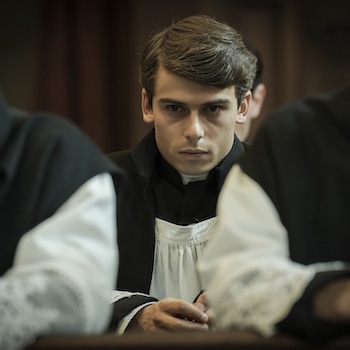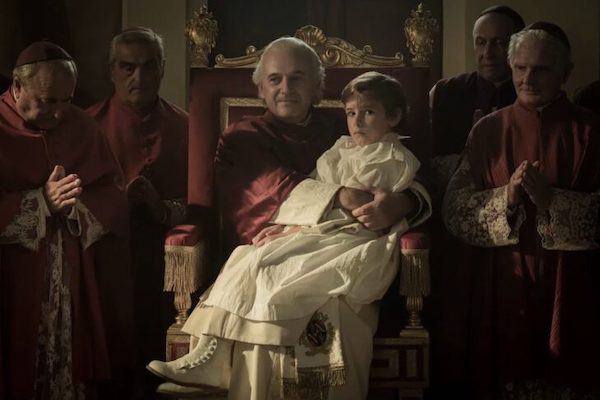Film Review: “Kidnapped: The Abduction of Edgardo Mortara” — Taken by Order of the Pope
By Steve Erickson
There is no denying that Kidnapped‘s warning about political authority abusing religion for its own accumulative ends resonates powerfully at this moment.
Kidnapped: The Abduction of Edgardo Mortara. Directed by Marco Bellocchio. Screening at Kendall Square Cinema.

Leonardo Maltese in Kidnapped :The Abduction of Edgardo Mortara. Photo: Anna Camerlingo
Kidnapped inserts a small, intimate story into a much larger historical drama. The film’s 133-minute runtime spans several decades in an ambitious attempt to fuse the micro and the macro, but it doesn’t fully succeed. The movie’s most potent moments are anchored in the domestic.
The narrative begins in the home of the Mortaras, a Jewish family living in Bologna in the 1850s. Their life is thrown upside down when their 6-year son Edgardo (played as a child by Enea Sala and an adult by Leonardo Maltese) is taken by priests. It turns out that, when he was an infant, the family’s servant (Aurora Camatti) secretly baptized him. His parents knew nothing of this. Legally, this act permits the Catholic Church to steal the child away from his parents and then throw him into an orphanage filled with Jewish children — who are forced to become Catholics. The Mortaras can only get custody of their son back by converting to Catholicism themselves. They refuse to capitulate and head to court to bring their child home.
Edgardo inevitably becomes a victim of Stockholm syndrome. He recites a Jewish prayer in Hebrew during his first night in the orphanage (and continues to do so under breath), but he must embrace the Latin language to survive. Sala’s performance aptly conveys the abducted boy’s mental state to be a blank state: his face rarely shows any emotion. When Maltese takes over the role, he maintains the same lack of affect, suggesting a lifelong numbness. His choice of religion taken away from him, Edgardo eventually comes into conflict with his best friend from childhood. The son even tries to baptize his mother on her deathbed. Two thirds of the way through, the film’s narrative expands from its tight focus on Edgardo and his family (as well as Paolo Pierobon’s Pope Pius IX), wrapping them up, somewhat sloppily, into a much larger political context.
Bellocchio directs Kidnapped with an operatic flair that, at times, gleefully departs from realism. For example, while looking at cartoons that are satirically mocking him, the Pope imagines the pictures coming to animated life. One of the Pope’s nightmares is dramatized: a group of Jewish men attack him in his bed and promptly have him circumcised. (This scene suggests just how personally he perceives Judaism to be a threat.) At another point, Edgardo has a dream in which Jesus comes to life after he has been removed from the cross. The film’s visuals also tend toward the plummy: nighttime scenes are drenched in shades of deep blue. Fabio Massimo Capogrosso’s score propels the melodrama forward via racing strings and bombastic timpani. (At times ,the music resembles what we might hear in a horror movie soundtrack.)

Paolo Pierobon and Enea Sala in a scene from Kidnapped: The Abduction of Edgardo Mortara. Photo: Anna Camerlingo
The subject of kidnapping has been on Bellocchio’s mind for years. He has turned to the Red Brigade’s abduction of politician Aldo Moro three times, directing a documentary, narrative feature, and TV series on the subject. Like Kidnapped, these projects sit at the intersection of personal trauma and the history of Italy. This concern with loss of control runs throughout Bellocchio’s work, as does the notion that no family story can avoid the political. His debut feature, Fists in the Pocket, placed ‘60s rebellion in the hands of a young man who seeks to murder his entire family. The title of Bellocchio’s previous film, 2021’s documentary Marx Can Wait, is also about an individual surrendering to impulse — it deals with the suicide of Bellocchio’s twin brother in 1968. The director’s critiques of the Catholic Church date back to 1971’s In the Name of the Father. Bellocchio has returned to the subject often enough to prove that it is a real fascination.
Kidnapped becomes a lesser film once Edgardo truly embraces his fate. The period piece contrivances take over, including elaborate scenes of massed extras. Following the twists and turns of the plot also requires some knowledge of Italian history. The film begins when papal states existed as independent territories ruled by the Pope and goes on to depict the struggle to unite them into one country. The pace speeds up to accommodate these changes, but it would require at least another half hour to do justice to the country’s transformation in this era. And then there are interludes of heavy-handed costume drama: Kidnapped‘s points about the Catholic Church’s abuse of children (nothing sexual in this story) and complicity in antisemitism are laid on thick. For instance, Bellocchio cuts between the Mortara family praying together and a Latin Mass at the Vatican.
Still, there is no denying that Kidnapped‘s warning about political authority abusing religion for its own accumulative ends resonates powerfully at this moment. (This is a cousin to recent horror films about the Catholic Church forcing pregnancy upon women.) Edgardo’s tragedy — losing his individual autonomy — mirrors the way we’re all feeling helpless, steered by social forces outside our control.
Steve Erickson writes about film and music for Gay City News, Slant Magazine, the Nashville Scene, Trouser Press, and other outlets. He also produces electronic music under the tag callinamagician. His latest album, Bells and Whistles, was released in January 2024, and is available to stream here.
